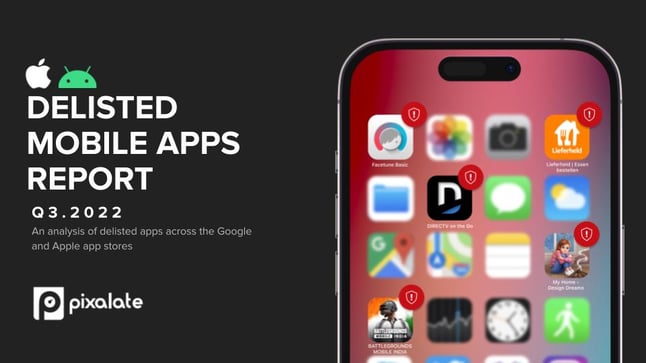
This week's review of ad fraud and privacy in the digital advertising space:

Pixalate released the Q3 2022 Delisted Mobile Apps Report, containing insights about mobile apps removed from the Google Play Store and Apple App Store. The analysis helps developers and advertisers recognize potential threats of privacy and compliance breaches.
Pixalate analyzed more than 5.1 million mobile apps across the Google and Apple app stores, and found 349,799 were delisted in Q3 2022, a decrease of almost 42% from the 592K delisted in Q2 2022. According to Pixalate’s data, Google and Apple combined have delisted over 1.1 million apps so far in 2022.

Mashable reported on payouts coming from TikTok as part of a settlement to a 2019 case brought against its parent company, ByteDance, for violating Illinois' biometric tracking act and disclosing which videos users watched. The suit states "the owners of Musical.ly, and later TikTok, failed to acquire consent from the parents of users under 13."

Tech giants Google and Meta reported declines in profits and ad sales respectively over the past week. Inflation and rising interest rates are finally hitting the Silicon Valley, according to the New York Times. While flourishing and expanding over the last decade, some tech companies are looking to reign in spending by slowing hiring and pausing expansion plans.

Reuters reported that the U.S. Department of Justice and Google have come to an agreement regarding loss of data due to responding to a 2016 search warrant. Under the agreement, Google will reform "its legal process compliance program to ensure timely and complete responses to legal process such as subpoenas and search warrants."

The European Union's final revisions of the long-standing Digital Services Act (DSA) were published this week, according to TechCrunch. Tech companies will now have to review the rules and figure out how to comply, as violation penalties are steep.
The revised rules are meant to increase transparency and accountability online, simplify how platforms deal with illegal content, goods and services, and regulate larger platforms by transparency measures geared towards their algorithms.
*By entering your email address and clicking Subscribe, you are agreeing to our Terms of Use and Privacy Policy.
These Stories on Weekly Recaps
*By entering your email address and clicking Subscribe, you are agreeing to our Terms of Use and Privacy Policy.

Disclaimer: The content of this page reflects Pixalate’s opinions with respect to the factors that Pixalate believes can be useful to the digital media industry. Any proprietary data shared is grounded in Pixalate’s proprietary technology and analytics, which Pixalate is continuously evaluating and updating. Any references to outside sources should not be construed as endorsements. Pixalate’s opinions are just that - opinion, not facts or guarantees.
Per the MRC, “'Fraud' is not intended to represent fraud as defined in various laws, statutes and ordinances or as conventionally used in U.S. Court or other legal proceedings, but rather a custom definition strictly for advertising measurement purposes. Also per the MRC, “‘Invalid Traffic’ is defined generally as traffic that does not meet certain ad serving quality or completeness criteria, or otherwise does not represent legitimate ad traffic that should be included in measurement counts. Among the reasons why ad traffic may be deemed invalid is it is a result of non-human traffic (spiders, bots, etc.), or activity designed to produce fraudulent traffic.”

